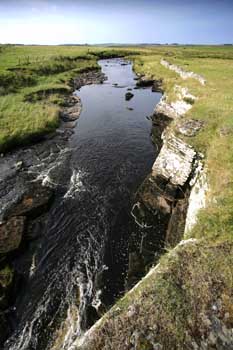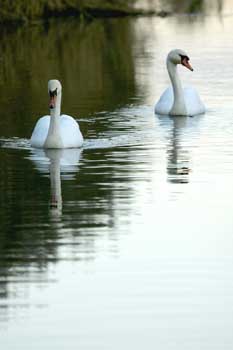Anglers, conservationists and river enthusiasts have called on the Government to take action after a new survey exposed the top three threats to waterways in England and Wales.
Earlier this year the RSPB, the WWF, the Angling Trust and the Association of Rivers Trusts joined forces to form the Our Rivers campaign – www.ourrivers.org.uk.
Feedback from the campaign’s many supporters across the UK in the six months since it launched indicate that the three biggest threats to rivers are: Chemical and sediment pollution from agriculture, over abstraction by water companies, and run-off water from urban areas.
 The results follow two alarming stories which have gained public attention in recent weeks – an Environment Agency report which revealed that three quarters of rivers in England and Wales are failing European targets, followed just days later by a major cyanide pollution incident on the River Trent which caused the death of thousands of fish and left local residents, anglers and conservationists fuming.
The results follow two alarming stories which have gained public attention in recent weeks – an Environment Agency report which revealed that three quarters of rivers in England and Wales are failing European targets, followed just days later by a major cyanide pollution incident on the River Trent which caused the death of thousands of fish and left local residents, anglers and conservationists fuming.
The new survey findings will heap extra pressure on the Government to take action as they prepare legally binding plans outlining how they will care for the country’s rivers and meet European water quality targets by 2015. Unfortunately, the drafts that have been circulated suggest little new action to tackle pollution from agriculture or urban areas while abstraction pressures could take decades to deal with under the current proposals.
“The information gathered from local people and groups in the first six months of this campaign has been extremely useful, and we are urging the Government to take notice,” said RSPB conservation director Mark Avery.
“Our army of supporters have used their local knowledge to identify the biggest threats to rivers in England and Wales. This makes for alarming reading, but the silver-lining is that our experts know the solutions to these problems – all we need now is for them to be properly implemented.”
Tom Le Quesne, Senior Policy Advisor at the WWF said: “It’s been great to see the campaign picking up pace in the six months since it was launched – there are clearly a lot of people out there who care passionately about their local rivers and the fish, birds and mammals that rely on them for their survival.
“We hope to present a united voice and tell the Government that when it unveils its final plans for rivers in December, they must be tough, robust and do the job properly. We won’t stand for a political fudge on this issue – our precious river wildlife cannot survive if we carry on treating our waterways the way we currently do.”
Mark Lloyd, chief executive of the Angling Trust, said: “The millions who go fishing on rivers every year are usually the first to notice when fisheries and insect life decline.
“Often these problems on our rivers are cumulative – many species and fisheries are experiencing a slow death by a thousand cuts. Most of our rivers receive heavy loads of sediment, fertilisers and pesticides, suffer low summer flows and then get hit with intermittent sewage and other pollutants from urban drainage. Our members want to see action plans which are actually implemented to deal with these problems.”
FishingMagic Notes
1. Since the Our Rivers campaign launched at the end of April, 217 regional river action groups and more than a thousand individuals have adopted local rivers and have been providing information on the pressures they face. The campaign has also been backed by seven MPs who are concerned about the state of the water courses in their constituency. The top five most adopted rivers on the Our Rivers website are the Thames, the Wey, the Kennet, the Trent and the Sussex Ouse.
2. Of the top three pressures identified, agricultural pollution has been reported in 197 of the adopted rivers, over-abstraction is a threat in 191 rivers and urban run-off pollution is a problem in 176 of the adopted rivers. The campaign is urging the Government to adopt the following solutions to these problems.
Problem: Agricultural pollution
Effects: Nitrates and Phosphates used in fertilisers can cause eutrophication of water and excessive algal growth, this can de-oxygenate water putting fish and consequently fish-eating mammals and birds such as kingfishers and otters at risk.
Soil that is washed off fields into rivers carries pollution and chokes gravel river beds, smothering fish spawning grounds and killing the bugs that form the base of the food chain.
Solution: Fertiliser and soil which ends up washed into water courses is a waste and costs farmers money. It is in farmers’ interests to take on more responsibility for managing soils both as a fundamental resource for food production and a pollutant. We need to see better enforcement of existing regulations, greater uptake of voluntary measures, like the Campaign for the Farmed Environment and more farmers entering land into agreements where they get additional money for protecting and enhancing the environment. But fundamentally we also need Government to provide new powers to regulate poor farming practice where it continues to pollute our rivers.
Problem: Over abstraction
Effects: In extreme circumstances this can result in riverbeds drying up with devastating impacts on river dwelling wildlife. Chronic low flows reduce the habitat available for fish, invertebrates and mammals as well as reducing the dilution available to deal with pollution.
Solution: Existing powers need to be used more effectively to clamp down on unsustainable abstraction. Over the next 5 years water companies will be tackling abstractions that are damaging the few rivers protected under European Wildlife Law. However, other rivers including Sites of Special Scientific Interest, and the vast majority of undesignated rivers will have to wait decades to see action taken. We want to see action taken more quickly alongside greater investment in leakage control and water efficiency to manage demand in the future.
Problem: Urban run-off pollution
Effects: Runoff from roads, car-parks industrial estates and housing carries a cocktail of silt, oil, chemicals etc. into our drains, often discharging with no treatment directly into the nearest watercourse.
Solution: Ensure that new legislation includes introduction of sustainable urban drainage systems (SUDS) that trap, and treat pollution to all urban areas. Incentives should also be given to encourage to retro-fitting of SUDS and other pollution control measures to existing sites where ecology is being impacted.

3. The Government is set to publish River Basin Management Plans for the 11 river basin districts of England and Wales as part of the new European Water Framework Directive at the end of the year. These plans will set out how the Department for the Environment, Food and Rural Affairs (Defra) deals with pollution, abstraction and other issues affecting rivers and wetlands but currently only propose a disappointing improvement in status of just 5% of waters.
4. A recent Environment Agency assessment revealed that just five rivers in England and Wales remain in ‘High’ status condition – all in remote areas of Northumberland and Wales. The report lists 26 per cent of rivers as ‘Good’ status. This means 74% of rivers are failing – including 117 rivers (2%) which are classified as ‘Bad’ making them among the worst in Europe.
The European Water Framework Directive requires the UK to bring all of its rivers up to ‘Good’ status or above by 2015. Current draft plans mean the UK will fail to reach this target.










